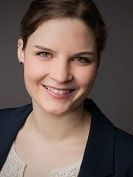
Luise von Keyserlingk, Ph.D.
Postdoctoral Scholar
School of Education
200 Public Services Building, Room 271, Irvine, CA 92617
Email: [email protected]
Postdoctoral Scholar
School of Education
200 Public Services Building, Room 271, Irvine, CA 92617
Email: [email protected]
Biography
Luise von Keyserlingk received her Diploma (equivalent to M.S.) in Psychology at the Technical University Dresden in Germany. During her study abroad at the University of La Serena in Chile, she started focusing on educational psychology. Broadening this focus, she moved to Berlin and started working at the Leibniz-Institute for Research and Information in Education (DIPF). She worked with longitudinal large-scale data and investigated students’ motivation and self-concepts at the transition from secondary school to higher education. She obtained her Ph.D. dissertation titled “Student Composition in School and Educational Trajectories of Young Adults” in 2019.
Research Interests
Luise von Keyserlingk is interested in understanding the underlying mechanisms of young adults’ educational choices and motivation. She aims to understand the role of different individual characteristics, as well as of contextual characteristics in such decisions.
With regard to the individual characteristics, she investigates the role of ability beliefs and interests on educational choices. In her recent research she focused on the role of domain specific ability beliefs and interests in secondary school on university major choice in in the STEM fields (science, technology, engineering, and mathematics).
In terms of contextual characteristics, she is interested in effects of student composition (peer effects) in secondary school on psychosocial variables and educational choices. A main focus lies on longterm effects of the achievement related and socioeconomic composition in school on individual ability beliefs (big-fish-little-pond effect) and postsecondary educational choices.
She has a strong interest in working with longitudinal data and quantitative analyses, such as multilevel analyses and latent modelling approaches.
Selected Publications
Keyserlingk, L. von, Becker, M., Jansen, M., & Maaz, K. (2019). Effects of student composition in school on educational pathways of young adults. Journal of Educational Psychology. DOI: 10.1037/edu0000411
Keyserlingk, L. von, Becker, M., Jansen, M., & Maaz, K. (2019). Leaving the Pond – Choosing an Ocean: Effects of Student Cmposition on STEM Major Choice at University. Journal of Educational Psychology. DOI: 10.1037/edu0000378
Keyserlingk, L. von, Becker, M., & Jansen, M. (2019): Academic self-concept during the transition to upper secondary school. Contemporary Educational Psychology 56, S. 152–160. DOI: 10.1016/j.cedpsych.2019.01.001
Becker, M., Brose, A., Camehl, G., Graeber, G., Huebner, M., Keyserlingk, L. von, Krekel, C., Maaz, K., Marcus, J., Margaryan, S., Möwische, D., Paul, A., Peter, F., Schmiedek, F., Schnitzleind, D., Schupp, J., Siedler, T., & Spieß, C. K. (2019). Politikberatung kompakt 137: Nichtmonetäre Erträge von Bildung in den Bereichen Gesundheit, nicht-kognitive Fähigkeiten sowie gesellschaftliche und politische Partizipation. Berlin: Deutsches Institut für Wirtschaftsforschung (English title: Non-monetary returns of education in areas of health, non-cognitive skills, and civic engagement)
Luise von Keyserlingk received her Diploma (equivalent to M.S.) in Psychology at the Technical University Dresden in Germany. During her study abroad at the University of La Serena in Chile, she started focusing on educational psychology. Broadening this focus, she moved to Berlin and started working at the Leibniz-Institute for Research and Information in Education (DIPF). She worked with longitudinal large-scale data and investigated students’ motivation and self-concepts at the transition from secondary school to higher education. She obtained her Ph.D. dissertation titled “Student Composition in School and Educational Trajectories of Young Adults” in 2019.
Research Interests
Luise von Keyserlingk is interested in understanding the underlying mechanisms of young adults’ educational choices and motivation. She aims to understand the role of different individual characteristics, as well as of contextual characteristics in such decisions.
With regard to the individual characteristics, she investigates the role of ability beliefs and interests on educational choices. In her recent research she focused on the role of domain specific ability beliefs and interests in secondary school on university major choice in in the STEM fields (science, technology, engineering, and mathematics).
In terms of contextual characteristics, she is interested in effects of student composition (peer effects) in secondary school on psychosocial variables and educational choices. A main focus lies on longterm effects of the achievement related and socioeconomic composition in school on individual ability beliefs (big-fish-little-pond effect) and postsecondary educational choices.
She has a strong interest in working with longitudinal data and quantitative analyses, such as multilevel analyses and latent modelling approaches.
Selected Publications
Keyserlingk, L. von, Becker, M., Jansen, M., & Maaz, K. (2019). Effects of student composition in school on educational pathways of young adults. Journal of Educational Psychology. DOI: 10.1037/edu0000411
Keyserlingk, L. von, Becker, M., Jansen, M., & Maaz, K. (2019). Leaving the Pond – Choosing an Ocean: Effects of Student Cmposition on STEM Major Choice at University. Journal of Educational Psychology. DOI: 10.1037/edu0000378
Keyserlingk, L. von, Becker, M., & Jansen, M. (2019): Academic self-concept during the transition to upper secondary school. Contemporary Educational Psychology 56, S. 152–160. DOI: 10.1016/j.cedpsych.2019.01.001
Becker, M., Brose, A., Camehl, G., Graeber, G., Huebner, M., Keyserlingk, L. von, Krekel, C., Maaz, K., Marcus, J., Margaryan, S., Möwische, D., Paul, A., Peter, F., Schmiedek, F., Schnitzleind, D., Schupp, J., Siedler, T., & Spieß, C. K. (2019). Politikberatung kompakt 137: Nichtmonetäre Erträge von Bildung in den Bereichen Gesundheit, nicht-kognitive Fähigkeiten sowie gesellschaftliche und politische Partizipation. Berlin: Deutsches Institut für Wirtschaftsforschung (English title: Non-monetary returns of education in areas of health, non-cognitive skills, and civic engagement)

